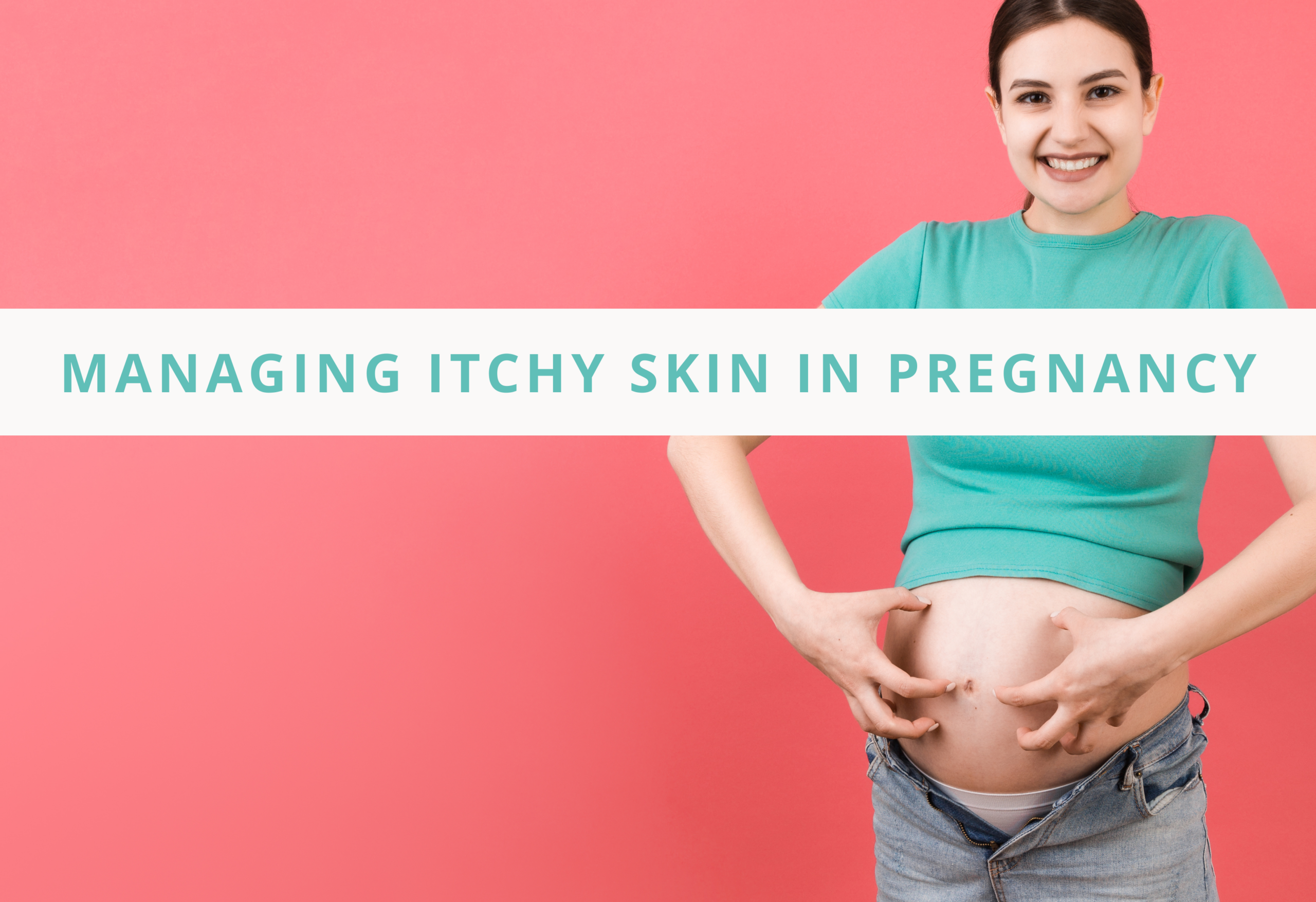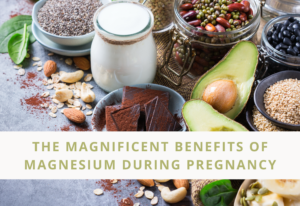Battling Itchy skin in pregnancy?
Pregnancy is a time of immense change and excitement, as your body prepares to welcome new life. However, it’s also a period when you may encounter some less talked about challenges, such as itchy skin. Known medically as pruritus, this common symptom can range from a mild annoyance to a sign of more serious conditions. It’s estimated that up to 14% of expectant parents experience some degree of itching during their pregnancy, often on the abdomen, but sometimes it can be more widespread.
While itchy skin is usually harmless and resolves after delivery, understanding its causes, how to manage the discomfort, and when it might be indicative of something more serious is essential for your health and peace of mind. In this blog post, we’ll dive into the world of pruritus during pregnancy, exploring why it happens, how to soothe the itch, and when to reach out to your healthcare provider for further advice.
Common Causes of itchy skin in pregnancy
Your body undergoes numerous changes in pregnancy, many of which can lead to itchy skin in pregnancy. Often, this itchiness is not indicative of a medical condition and can be attributed to the natural physical and hormonal changes occurring in your body. Here are some common reasons why you might experience itchy skin in pregnancy that are unrelated to medical conditions:
Stretching Skin: As your baby grows, the skin around your abdomen stretches to accommodate this growth, which can lead to dryness and itchiness. This stretching can also affect other areas like your breasts, thighs, and buttocks.
Hormonal Changes: Pregnancy hormones can cause a variety of skin changes, including increased sensitivity and dryness. These hormonal fluctuations can make your skin feel itchy, especially as your pregnancy progresses.
Increased Blood Flow: During pregnancy, your blood volume increases to support the growing fetus. This increased circulation can cause the tiny blood vessels near the surface of your skin to expand, leading to itchiness.
Sweating and Heat Rashes: Pregnant people often sweat more due to hormonal changes and increased body temperature. This excess sweat can lead to heat rashes, especially in the folds of the skin, which can be quite itchy.
Dry Skin: The skin tends to become drier during pregnancy, partly due to hormonal changes and the need for extra hydration. Dry skin is more prone to itching, making regular moisturizing essential.
How to Alleviate Itchy Skin in Pregnancy
To alleviate itchy skin during pregnancy, adopting simple self-care practices can make a significant difference. First, ensure you stay well-hydrated by drinking plenty of water throughout the day, as this helps maintain skin hydration from the inside out. Use mild, fragrance-free soaps and moisturizers to avoid further skin irritation. Applying a moisturizer immediately after taking a short, lukewarm shower or bath can help lock in moisture.
Wearing loose, breathable clothing made from natural fibers like cotton can also reduce skin irritation and prevent overheating. For immediate relief, applying a cool, damp cloth to itchy areas or using over-the-counter anti-itch creams designed for pregnant individuals (after checking with your midwife or healthcare provider) can be helpful. Lastly, avoid scratching as much as possible to prevent the skin from becoming damaged and more irritated. If these measures do not provide relief, or if the itchiness is severe, it’s important to consult your midwife or healthcare provider for further advice and to rule out any underlying conditions.
Specific Complications related to itchy skin in pregnancy
Itchy skin during pregnancy, or pruritus, can range from mild irritation on the abdomen to more severe conditions that require medical attention. Five pregnancy-specific dermatoses are:
- Intrahepatic Cholestasis of Pregnancy (ICP): Causes severe itching, especially on the palms and soles, often starting in the late second to early third trimester.
- Atopic Eruption of Pregnancy (AEP): The most frequent dermatosis, possibly linked to a history of atopy. It manifests early in pregnancy with extremely itchy papules.
- Polymorphic Eruption of Pregnancy (PEP/PUPPP): Begins in the third trimester, characterized by an itchy rash within abdominal stretch marks.
- Pustular Psoriasis of Pregnancy: A rare condition presenting with pustules in areas like the groin and under the breasts.
- Pemphigoid Gestationis (PG): An autoimmune disorder leading to itchy lesions, primarily affecting the extremities.
When to Contact Your Midwife About Itchy Skin During Pregnancy
Experiencing itchy skin in pregnancy is quite common, but how do you know when it’s just a normal part of pregnancy and when it might be something more serious? While most cases of pruritus are harmless and merely uncomfortable, there are times when itching can be a sign of a more significant health concern that requires professional attention. Here’s when you should consider reaching out to your midwife about itchy skin:
Persistent and Intense Itching: If you find that the itching is constant, severe, and not relieved by standard remedies like moisturizing or avoiding irritants, it’s time to speak with your midwife. This type of itch can interfere with your daily activities and sleep, significantly impacting your quality of life.
Itching Without a Rash: It’s particularly important to contact your midwife if you’re experiencing intense itching without any visible rash, especially if it’s worse at night. This can be a symptom of Intrahepatic Cholestasis of Pregnancy (ICP), a liver condition that can have implications for your baby’s health.
Itching with Additional Symptoms: If your itching is accompanied by other symptoms such as jaundice (yellowing of the skin and eyes), dark urine, light-colored stool, or general feelings of unwellness, these could be signs of liver issues or other pregnancy-related conditions that require immediate evaluation.
Localized Itching with a Rash: While a rash with itching can often be a benign condition like PUPPP (Pruritic Urticarial Papules and Plaques of Pregnancy), it’s still a good idea to get it checked out, especially if it’s severe, to rule out other causes and to receive relief measures.
Remember, your midwife is there to support you throughout your pregnancy journey, including managing any discomforts like itchy skin. They can provide personalized advice, recommend effective treatments, and, if necessary, refer you to a specialist for further evaluation. Don’t hesitate to reach out with any concerns; it’s always better to be safe and ensure both your health and your baby’s health are monitored closely.
FAQs about Itchy skin in pregnancy
Can dietary changes help reduce itching during pregnancy? Yes, dietary changes can sometimes help manage itching during pregnancy. Incorporating foods rich in vitamins, minerals, and omega-3 fatty acids, like fish, nuts, and seeds, can improve skin health and potentially reduce irritation. However, it’s always important to discuss significant dietary changes with your healthcare provider to ensure they’re safe for you and your baby.
Is it normal for itching to worsen at night? Many people find that their itching becomes more intense at night. This could be due to a combination of factors, including increased skin temperature from bedding, less distraction from daytime activities, and the body’s natural circadian rhythms affecting skin functions. Keeping your sleeping area cool and using lighter bedding may help alleviate nighttime itching.
Can stress contribute to itching during pregnancy? Yes, stress can exacerbate itching during pregnancy. Stress can affect your body in various ways, including your skin’s health, potentially making itching worse. Finding effective stress-reduction techniques, such as prenatal yoga, meditation, or gentle exercise, can help manage stress levels and might reduce itching.
Is sun exposure safe for relieving pregnancy itching? While moderate sun exposure can help with certain skin conditions by promoting vitamin D production, it’s important to be cautious, especially during pregnancy. Excessive sun exposure can lead to sunburn and worsen skin irritation. Always use sunscreen and consult your healthcare provider before using sun exposure as a remedy for itching.
Can hydrating more help with itchy skin during pregnancy? Yes, staying well-hydrated is crucial for maintaining healthy skin during pregnancy. Dehydration can lead to dry skin, which may exacerbate itching. Ensure you’re drinking enough water throughout the day and consider using a humidifier in your home to help keep your skin hydrated from the outside in.
Additional Resources on Itchy Skin in Pregnancy
- Pruritus in Pregnancy from the National Library of Medicine
- Pruritic Rash in Pregnancy from the American Family Physician
- Assessment and management of itchy skin in pregnancy from the Australian Journal of General Practice
- Learn more about Common Pregnancy Discomforts here.





